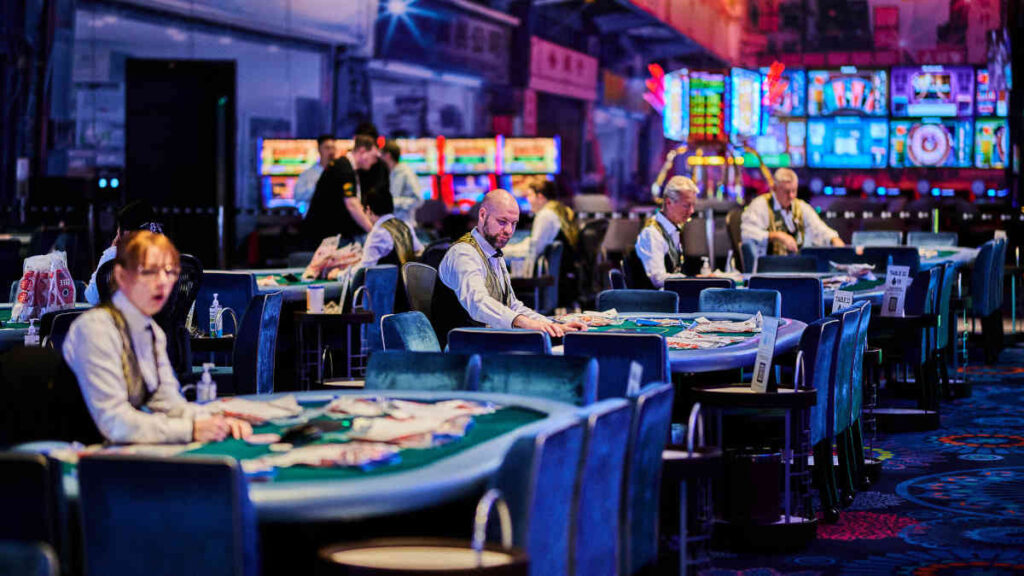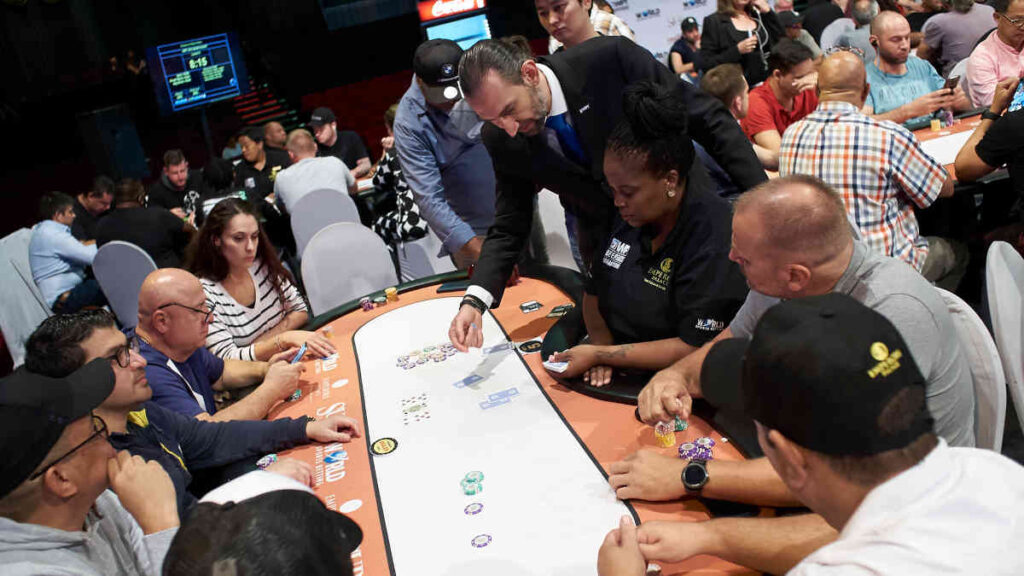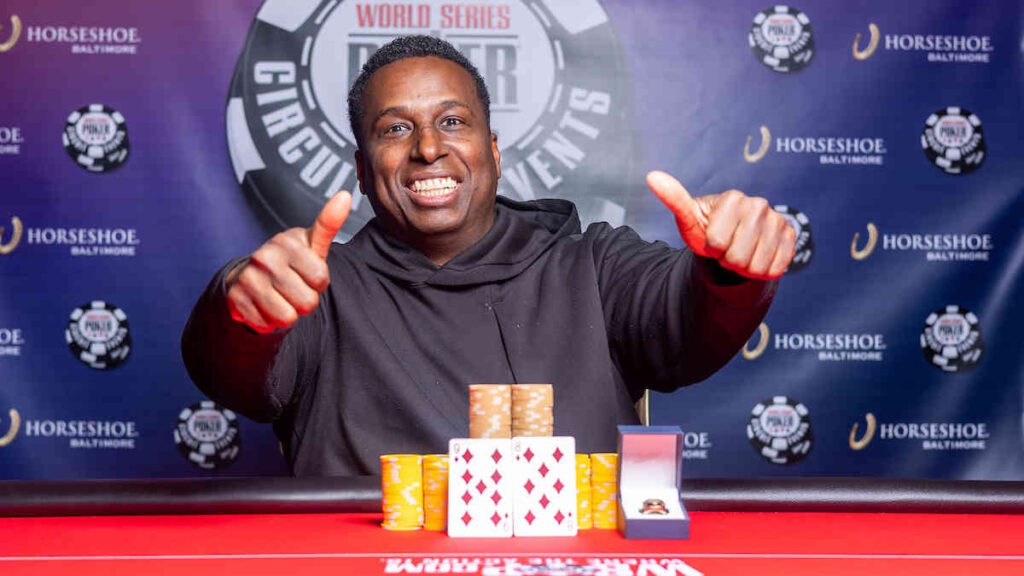Images courtesy of World Poker Tour
In full disclosure, before this summer, I basically prided myself on never having called the floor to come to the table to help me or another player.
However, when I played a cash game at MGM Grand, there was a player with such rudeness and Main Character Syndrome that I reported them on my way out of the poker room. Interestingly, I got mixed results by the floor.
One floor personnel (the supervisor) sided with me and asked if I’d like to file a report (I declined), but another floor person seemed to be siding with my aggressor, as she was laughing and nodding along to him off to the side.
Moreover, when I first approached her for help, she asked me somewhat accusatorily if what was happening was “just normal poker talk.”
This led me to wonder, when is it okay to call the floor? Moreover, when is it necessary or required to call the floor?
Confused, and honestly a bit upset with the mixed results I received, I reached out to Steven Pique, the Director of Operations for the MGM Grand poker room, to get some clarity. Pique informed me that,
We [at MGM Grand] will never tolerate a player belittling or making rude/discourteous comments to anyone. I will have a conversation with [the floor employee] and her direct manager about how these conversations are supposed to happen.
He continued that,
Our supervisors are meant to be arbiters and create a positive environment for our players. When I hear that our staff was anything less than accommodating, it’s extremely disappointing.
I appreciated his prompt and reassuring response.
Now, I can handle and have been around my fair share of “normal” poker banter (including abnormal behaviors, such as a player showing me a video of a woman masturbating and another guy at another table sending me air kisses and mouthing “I love you” every time I looked up).
However, directing curse words and blatantly antagonizing players and commanding them to “call the floor if you’re so upset” isn’t conducive to a good poker environment, which is exactly what this antagonistic player was doing.
Further, I’ve been encouraged by many people to start calling the floor for harassing behavior, and I’m proud to say that I finally got the courage to speak up in a negative situation.
Simply put, I was glad I left that situation that day, glad I spoke to the floor, and glad I reached out to the Director of Operations who clarified under no uncertain terms was the other player’s behavior unacceptable.
When Should the Floor be Called
According to Matt Savage,
A player should call the floor any time they feel that a decision or issue is being incorrectly handled. The way they do this is to ask the dealer to call the floor.
Moreover,
The dealer should call the floor if: (1) requested by a player or if they have a situation that they or any player at the table does not have an answer for, (2) if there is a situation that is abusive towards another player or dealer, and, of course, (3) if there is a seat open that creates a short table.
Robbie Williford, tournament director at MGM National Harbor shared that,
Calling the floor is important to give security to patrons. It’s also important for the players to make sure the dealer stops action as soon as the question arises to prevent substantial action from occurring. Once further action occurs there may be no recourse for the previous mistake or the patron.
Further, dealers need to hold themselves accountable to their mistakes. As Robbie Williford candidly shared, “a dealer should always call the floor when requested by a patron or even if the floor is not requested, but the dealer knows they made a mistake, the floor should be called.”
Clearly, integrity and player enjoyment of the game seem to be of paramount importance.

Steven Pique further added to my understanding of when a player should call the floor. He shared that if the explanation players are getting from the dealer do not satisfy the questions from the players, he’d “encourage players to either speak to staff privately away from the table, or If the players need an active decision from a staff member in real time, anyone can and should call a floor for assistance.”
While dealers should “handle misdeals themselves, every other decision should come from a supervisor to offer definitive clarity.”
One floor that wished to remain anonymous disagreed slightly that players, as well as dealers, can and should call the floor, stating that,
You should let the dealer call the floor. The only time you should call the floor yourself is if someone is threatening you and the dealer is not helping, but even then, it’s best to speak to the floor privately unless it’s an immediate threat.
Additionally, the floor can and should be called if a player is excessively tanking and needs the clock to be called on them one or more times, a dialogue that was once again reignited due in large part to Martin Kabrhel’s tanking antics during the WSOP.
When Will A Player Be Removed
While this varies from cardroom to casino, at MGM Grand, Steven Pique shared that,
Our staff members ask that players treat everyone with respect. If we find out about intoxicated players or rude and/or discourteous behavior, we should pull players away from the game to have a conversation about our expectations.
Once they are aware, now we can explore harsher options such as asking a player to leave for the day. Lengthy periods of time away from the department or property will be determined based on the player’s actions as time rolls on.”
Subsequently, Robbie Williford shared that players will get into trouble for
Breaking simple rules like vaping or smoking to things like rude and disrespectful behavior (to staff or other guests). Those actions could lead to a 24-hour-long ban or possibly longer if they are a repeat offender. You can trust that all casinos note your file when you misbehave.
Physical harm to another, threats, theft, or most other illegal action would usually result in forever bans, but each instance will be unique and require unique punishments. There really isn’t a catch all explanation.”
A floor that wished to remain anonymous corroborated these statements, sharing simply that
Intoxication, bad behavior, and harassment could be a one-day ban or longer. Theft and violence is an automatic trespass and removal indefinitely. Even a threat of violence can lead to a player being sent home.
Robbie summarizes the bottom line nicely – “It’s just easier to act like a decent human and not push your luck!“
Final Thoughts
While I still am not a fan of calling the floor, there’s no doubt that there is a time and place for it and sometimes it’s of paramount importance and critically necessary to protect patrons, the dealer, and/or the integrity of the game.
I hope this has shed some light on how the floor views its role as it relates to how and when to call them over. As always, good luck on the felt and run good!


